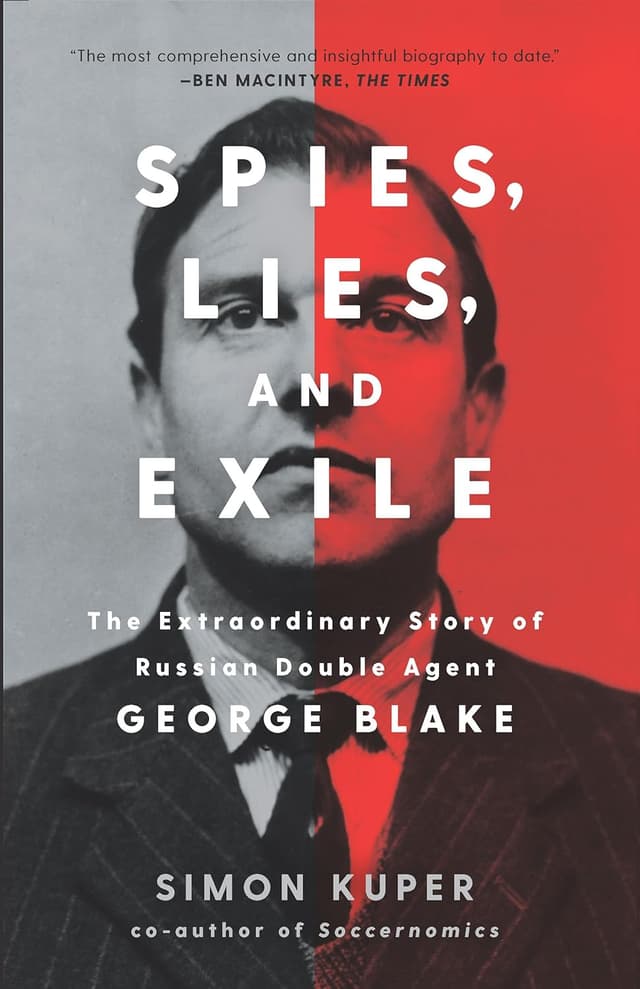Colin Nagy | May 27, 2021
The Double Agent Edition
On the Cambridge Five, spycraft, and coaxing out a story
Recommended Products

A thoughtful, comprehensive biography of George Blake, a fascinating character who played an outsized, and deadly, role in European history.
Colin here. In the countless tales of modern espionage, the story of the Cambridge Five is probably the best known. Five British citizens, Donald Maclean, Guy Burgess, Kim Philby, Anthony Blunt, and John Cairncross were recruited during their time as students at Cambridge in the 1930s and were responsible for passing volumes of state secrets to Russia. They were recruited by a masterful intelligence officer, the Czech national Arnold Deutsch, in what was one of the most successful, long-game approaches to intelligence. Thanks to the volume of books, documentaries, and analysis, we know a lot about this group: notably Kim Philby, who made a last-ditch daring escape to Russia by skipping a dinner party in Beirut and boarding a freighter bound for the Soviet Union.
There was another traitor who delivered secrets to Russia, perhaps even doing more harm than the Cambridge Five. His name, however, hasn't been particularly well-known until recently: George Blake. FT Columnist Simon Kuper recently wrote a book about him, revealing Blake’s disclosures as a double agent actually caused more damage than his more famous compatriots:
According to the CIA, he passed on a staggering 4,720 documents. Some of these included details of an elaborate Anglo-American plan in 1955 to tunnel into the Soviet sector in Berlin, in the hope of tapping enemy communications cables. The KGB was aware of this plan, but valued its star agent so highly that for almost a year it did nothing, for fear of exposing him. The tunnel went ahead, providing London and Washington with a bonanza of intelligence until at last the KGB took steps to have its existence revealed.
While Kuper notes that there was a lot of chaff passed along with the figurative wheat, the volume of intelligence passed along had disastrous consequences on real lives:
...Blake’s intelligence had a devastating effect—on the lives of the hundreds of men and women exposed by him as MI6 sources operating behind the Iron Curtain. These people were either imprisoned, lost their jobs, were refused entry at borders, or were executed.
Why is this interesting?
Beyond the spy versus spy tales of Russia, Britain, and the US, what I found most interesting was the ability of Simon Kuper to coax a story out of a reluctant source. While Blake’s incarceration for spying and subsequent escape from Wormwood Scrubs prison in London was front-page news in the early 1960s, he had fallen off the radar. The average British citizen could certainly call out Kim Philby’s name at a pub, but Blake would likely only be mentioned on trivia night. Kuper was initially turned onto the story from a 1999 interview Blake gave to a Dutch magazine. But after that article Blake once again went quiet. The reasons were twofold: First, according to Kuper, Blake didn’t really want to put his opinion of Putin on the record (since his exile and livelihood were now under the strongman’s power). The second reason was much more personal, however. His three British sons, as well as their mother, Gillian, were not overjoyed to read about Blake, the British traitor, in the papers.
So, Kuper agreed to a few ground rules. He agreed to publish the interview only in Dutch, and also not talk about modern Russian politics. He also later negotiated to only publish his book after Blake died. The resulting book is a thoughtful, comprehensive biography of a fascinating character who played an outsized, and deadly, role in European history. But what was most interesting to me is that there was an air gap between Kuper’s early output in Dutch and the lack of translation into the English press. It seems like we live in a world where all information is instant, accessible, and ready. But even in our borderless digital world, language can still be a wall that keeps stories from spreading. (CJN)
Turtle of the Day:
From friend of WITI Edith Zimmerman’s latest Drawing Links newsletter.
Quick Links:
Old coverage of the MI5 and MI6 coverups of the Cambridge Five (CJN)
Blake’s obit in the NYT (CJN)
Aren't we smart, fellow behavioral scientists: questioning Behavioral economics. (NRB)
Thanks for reading,
Noah (NRB) & Colin (CJN)
—
Why is this interesting? is a daily email from Noah Brier & Colin Nagy (and friends!) about interesting things. If you’ve enjoyed this edition, please consider forwarding it to a friend. If you’re reading it for the first time, consider subscribing (it’s free!).

